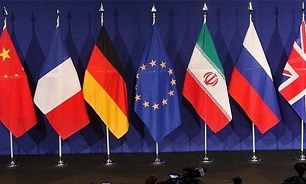Iran Will Take 2nd Step to Reduce JCPOA Commitments
 A June 28 meeting of the JCPOA joint commission in Austria gave rise to speculation that Iran may refrain from or postpone scaling down its commitments to the nuclear deal following promising signs that the Instrument in Support of Trade Exchanges (INSTEX) may ease Tehran’s foreign trade ties.
A June 28 meeting of the JCPOA joint commission in Austria gave rise to speculation that Iran may refrain from or postpone scaling down its commitments to the nuclear deal following promising signs that the Instrument in Support of Trade Exchanges (INSTEX) may ease Tehran’s foreign trade ties.
However, an informed source has told Tasnim that Iran will definitely carry out the second step to reduce its JCPOA commitments in due time, most likely on July 7, given that its conditions have not been met and the INSTEX has proved totally insufficient for Iran’s needs.
The reason why Iran has not announced the result of first moves to scale down the JCPOA commitments is that the International Atomic Energy Agency (IAEA) will probably declare the issue in the coming days, the source noted.
In its first step, Iran announced the decision to stop selling any 3.67% enriched uranium above the 300-kg limit and also decision to stop selling its heavy water above the limit of 130 tons.
As regards China and the UK’s plan to continue cooperation with Iran in redesigning the Arak heavy water reactor, the informed source said those two countries have announced in the final statement of the JCPOA joint commission meeting in Vienna that they will finish redesigning the Iranian reactor in due time.
If this process goes on correctly, another subject will replace the issue of Arak reactor in the second step of reduction in Iran’s commitments to the JCPOA, the source added.
Iran and the Group 5+1 (Russia, China, US, Britain, France, and Germany) on July 14, 2015, reached a conclusion over the text of the 2015 nuclear deal.
The accord took effect in January 2016 and was supposed to terminate all nuclear-related sanctions against Iran all at once, but its implementation was hampered by the US policies and its eventual withdrawal from the deal.
On May 8, 2018, US President Donald Trump pulled his country out of the nuclear accord.
Following the US withdrawal, Iran and the remaining parties launched talks to save the accord.
However, the EU’s failure of ensure Iran’s economic interests forced Tehran to stop honoring certain commitments under JCPOA in May 2019.
Iran has also set a 60-day deadline for the remaining JCPOA parties to fulfill their undertakings.
At a cabinet session on May 8, Iranian President Hassan Rouhani said the five remaining parties to the JCPOA -Russia, China, Britain, France and Germany- have been informed of Tehran’s decision to refuse to continue honoring two commitments under the deal.
He said Iran stops selling any enriched uranium above the 300-kg limit in exchange for yellow cake and also stops selling its heavy water above the limit of 130 tons.
The president also announced that the JCPOA parties will have 60 days to come to the negotiating table and fulfill Iran’s main interests under the nuclear deal, especially regarding oil sales and banking interaction.
If Iran does not achieve the desired results after 60 days, it will take two more measures and stop observing the limit on uranium enrichment to 3.67 percent purity, he added.
The president said Iran will also make a new decision about its Arak heavy water reactor –which was planned to be renovated with the participation of the JCPOA parties- after the 60-day deadline.
Rouhani also threatened that Iran will take a “decisive measure” if the JCPOA parties would intend to send Iran’s nuclear case to the UN Security Council.
Message end/
